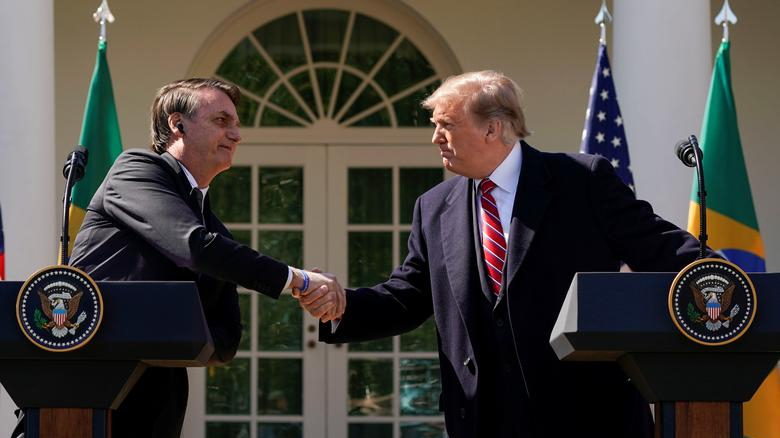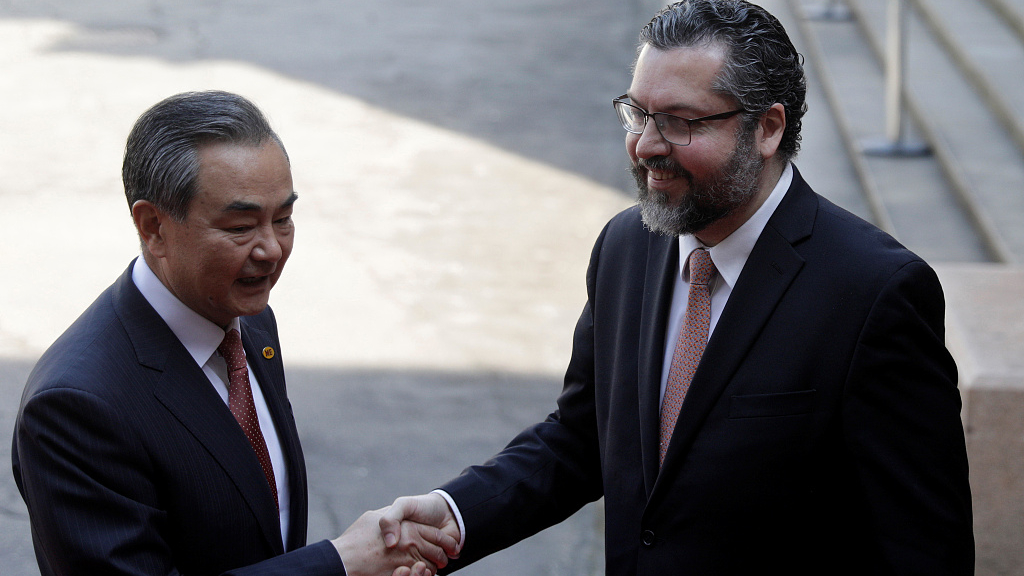

Brazil's President Jair Bolsonaro and U.S. President Donald Trump at a joint news conference in the White House, Washington D.C., U.S., March 19, 2019. /Reuters Photo
U.S. President Donald Trump on Wednesday elevated Brazil's status to "a major non-NATO ally" that will grant the Latin American country access to more advanced American weapon systems, just days after Brasilia assured Beijing that its efforts to build better ties with Washington would not hamper its relation with China.
"I hereby designate the Federative Republic of Brazil as a major non-NATO ally of the United States," Trump said in a notice sent to State Department, referring to the North Atlantic Treaty Organization (NATO), an intergovernmental military alliance between 29 North American and European countries.
The U.S. offers priority access to its formidable weapons market and an upgraded defense cooperation to countries with non-NATO ally status, which currently includes allies such as Egypt, Israel, New Zealand and the Taiwan region.
The move to include Brazil in the exclusive group was initiated by Trump in March when Trump, during his meeting with visiting Brazilian President Jair Bolsonaro, expressed his intention to upgrade the status of U.S.-Brazil security relationship.
Later in May, Trump formally notified the U.S. Congress his intent to grant the status of a major non-NATO ally. "I am making this designation in recognition of the Government of Brazil's recent commitments to increase defense cooperation with the United States, and in recognition of our own national interest in deepening our defense coordination with Brazil," Trump wrote in a letter to the Congress.
The U.S. President is increasingly developing close links with the Brazilian right-wing leader who has been dubbed as the "Trump of Brazil" ever since his surprise election last year. Last month, Brazil nominated Bolsonaro’s son, lawmaker Eduardo Bolsonaro, for the position of Brazil's ambassador to the U.S., drawing further parallels with Trump who has been criticized for taking nepotism to alarming depths by favoring family members for official roles.
On Tuesday, Trump said his administration is working with Brazil, a major producer of raw materials and farm products, on a new free trade agreement that would lower tariffs.
'We never had any issue with China'

Brazil's Foreign Minister Ernesto Araujo (R) welcomes Chinese State Councilor and Foreign Minister Wang Yi during a BRICS foreign ministers' meeting in Rio de Janeiro, Brazil, July 26, 2019. /VCP Photo
Related stories: As Brazil shifts right, how will this affect BRICS cooperation?
BRICS 2018: Latin America paramount to South-South cooperation
Amid growing signs of Brazil gradually inching closer to Washington at a time when U.S. is engaged in a trade war with China, which is also the largest trade partner of the Latin American country, Brasilia last week attempted to assuage Beijing in what appeared like a balancing act.
Brazilian Foreign Minister Ernesto Araujo asserted that his country's efforts to improve relations with the U.S. did not have to endanger links with China, the world’s second largest economy, because Brazil had never had a problem with China.
"We never had any issue with China. We had an issue with how Brazil itself was organizing, or not organizing, its relationship with China," Araujo told reporters last Friday after hosting his counterparts from Russia, India, China, and South Africa at the BRICS foreign ministers' conference in Rio De Janeiro.
Brazil is a member of the five-nation bloc that brings together the world's top emerging economies and is seen by many analysts as a counterweight to the Western dominance in the evolving new world order.
Brazil is Latin America's most populous country and also the continent's biggest economy. It will host this year's BRICS Summit later in November.
(With input from agencies)

Copyright © 2018 CGTN. Beijing ICP prepared NO.16065310-3
Copyright © 2018 CGTN. Beijing ICP prepared NO.16065310-3